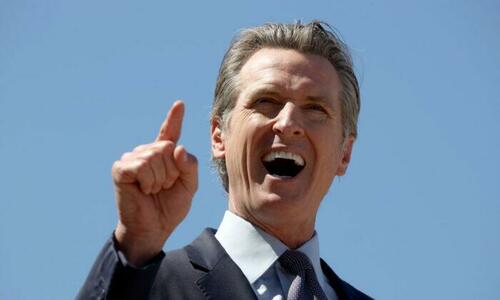California Voters Reject Millionaire Tax To Boost Electric Vehicle Use
Authored by Bryan Jung via The Epoch Times,
California voters on election day rejected a millionaire tax to boost electric vehicles (EVs) and and state wildfire response programs.
Proposition 30 would have added a tax to promote the use of EVs by creating a Clean Cars and Clean Air Fund, which would be separate from the state’s general fund.
Residents with an annual income of above $2 million would be forced to pay an extra 1.75 percent tax on their earnings to support the programs, starting on January 2023, according to the state (pdf). The tax would have been imposed on fewer than 43,000 of California’s 39 million residents.
California’s marginal tax rate would have risen from 13.3 to 15.05 percent, giving the state the highest income tax level in the country.
The proposal had a lifespan of 20 years, or would end if California brought greenhouse emission down to 80 percent below 1990 levels for three consecutive years, according to the state analyst’s office.
Electric vehicle purchases and the building of electric charging stations throughout the state would have been subsidized by the proceeds from the tax.
The other half of the proposal would better prepare California’s response to wildfires, with an added emphasis on firefighter hiring and training.
The amendment, if it had passed, was estimated to have brought in $3–5 billion annually.
Gov. Newsom Opposed His Own Party on the Proposition
Ironically, California’s Democrat governor, Gavin Newsom, normally a supporter of eco-friendly vehicles, was a strong opponent of the proposal, putting him in opposition to his own party.
Newsom accused the amendment of being a Trojan Horse to enrich the ride-sharing company Lyft, which had funded support for the proposition with millions of dollars.
“Proposition 30 is being advertised as a climate initiative,” said the governor in a TV commercial against the state amendment.
“But in reality, it was devised by a single corporation to funnel state income taxes to benefit their company. Put simply, Prop 30 is a Trojan horse that puts corporate welfare above the fiscal welfare of our entire state.”
A coalition of environmental and health groups and the Democrat Party of California were the other major backers of the plan.
Newsom, in a strange twist, sided with the California Republican Party, along with the California Teacher’s Association, the California Chamber of Commerce, and the California Hawaii State Conference NAACP.
The Democrat Governor and the California GOP Join Forces to Prevent the Tax
The governor had been touting his own separate plan to ban the sale of all combustion engine vehicles in the state by 2035 by compelling residents to buy the highly expensive EVs in the name of reducing carbon emissions.
Besides the proposal, California had already set aside $6.5 billion in subsidies for EVs and public charging stations, with additional plans to spend another $10 billion over the next five years.
However, the backers of Proposition 30 claimed it would actually help speed the transition to EVs by making it easier for low-income residents to buy the low-emission cars by partially subsidizing their purchase.
Opponents like Newsom said that Lyft was funding Proposition 30 for its own benefit, since state regulators at the California Air Resources Board have already required that 90 percent of all ride-shares use EVs by 2030.
Newsom accused Lyft of making a stealth play to have the state subsidize the purchase of EVs for its own employees, as the proposition did not clearly specify who would cover the costs of the transition to the new technology.
Opponents said that ride-share companies like Uber and Lyft should shoulder the burden instead of having the state subsidize its drivers to buy the vehicles, which they had requested, reported CalMatters.
The governor also said that the proposal would siphon money into the special EV fund and away the state’s general fund, which is used for funding programs ranging from education to public healthcare.
Lyft refuted the governor’s accusation, saying that it supported the measure out of genuine concern over climate change and claimed that the funds would not benefit it specifically.
“Proposition 30 funds this through a tax on individuals who earn more than $2 million a year. I’m fortunate enough to be impacted by this tax and happy to pay it to help turn back the clock on this existential threat,” wrote Lyft CEO Logan Green in a company blog post.
The other major lobbying group opposing the tax were California’s teacher unions, who demanded that the money raised be better spent on public schools.
Newsom’s critics cynically accused him of not supporting the proposal due to pressure from his wealthy donors.
Tyler Durden
Thu, 11/10/2022 – 11:22

